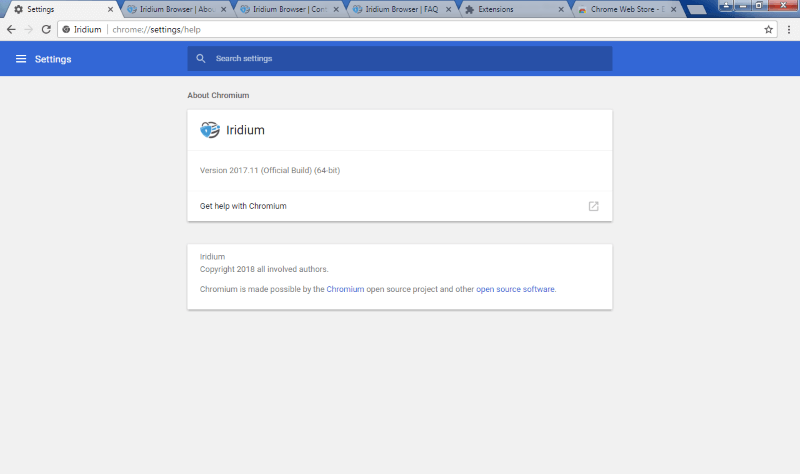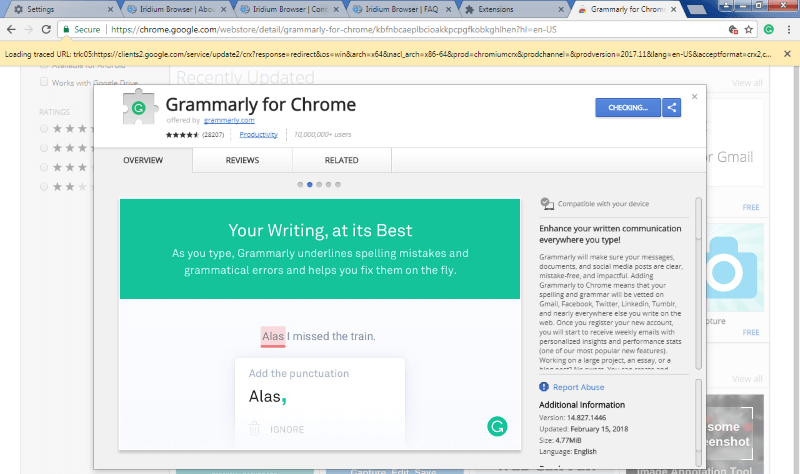Brief: Iridium is a web browser based on Chromium project. It has been customized to not share your data and thus keeping your privacy intact.
Google Chrome is one of the most popular web browsers in use today. People like it because it is quick and highly customizable. However, many people are leery of using it because Chrome tends to send lots of user information home to the massive Google servers. (You didn’t think that Google built these huge data centers to store cat videos, did you?) Thankfully, there is an alternative for those who are privacy conscious.
[irp posts=”26345″ name=”Mozilla Says It is Raising Privacy Awareness By Violating Privacy of Users”]
What is Iridium?

Iridium Browser is a browser based on the Chromium project. This is the same project that Google Chrome is based on. The difference is that the Iridium team modified the code to make it respect your privacy.
Iridium is not a fly-by-night project. It is backed by the Open Source Business Alliance. According to Iridium, the OSBA has around 190 members.
Here is a list of the many enhancements the project made to the Chromium code.
- Increase RSA keysize to 2048 bits for self-signed certificates
- Generate a new WebRTC identity for each connection instead of reusing identities for 30 days
- Generate a new ECDHE keypair for each WebRTC connection instead of reusing them for multiple connections
- Disable using system-provided plugins (i.e. Java, Flash, etc.)
- Disable “Use a web service to help resolve navigation errors”
- Disable autocomplete through prediction service when typing in Omnibox
- Always send “Do-Not-Track” header
- Network/DNS prediction is disabled by default
- Block third-party cookies by default
- Fetch plugins list from iridiumbrowser.de where it will be updated regularly
- Site data (cookies, local storage, etc.) is only kept until exit, by default
- Passwords are not stored by default
- Input form autofill is disabled by default
- For IPv6 probes, use a DNS root server instead of Google
- The default search provider is Qwant
- Load “about:blank” on new tabs instead of the currently set search engine and/or promotions.
- Don’t report Safe Browsing overrides.
- Don’t use autofill download service.
- Disable cookies for safe browsing background requests.
- Disable the battery status API.
- Disable background mode
- Disable EV certificates, so they are shown just like “normal” certificates
- Disable Google cloud printing
- Disable Google hot word detection
- Disable Google experiments status check
- Disable Google translation service
- Disable Google promotion fetching
- Disable Google Cloud Messaging (GCM) status check
- Disable Google Now
- Disable automatic update check
- Disable profile-import on first run
- Network/DNS prediction is disabled by default
- Let user confirm downloading translation dictionaries from Google
- Always prompt for download directory
- Don’t ask to send settings to Google by default on profile reset
- Show all extensions (including internals) in
chrome://extensions.
Since Iridium is based on Chromium, you can make use of any of the plugins on the Chrome Web Store.
[irp posts=”27249″ name=”Tutanota: Encrypted Open Source Email Service for Privacy Minded People”]
Iridium is available for Windows, macOS, Debian, Mint, Ubuntu, openSUSE, Fedora, Red Hat Enterprise Linux, and CentOS. They offer both an installer and a portable version for Window. Iridium is not available for any mobile operating systems.

Experiencing Iridium browser
Overall, I had a good experience with Iridium. I was able to install all four of the extensions that I use. I did not have any trouble visiting the page that I wanted to look at. A yellow notification flashed up a few times while I was in the Chrome Web Store to show me where I was being redirected to. Since I was in the Chrome Web Store it was not a problem.
One cosmetic issue that I noticed was that the branding was inconsistent. Some places said Iridium while others said Chromium. Whenever I see this on a forked project, I think to myself “I wonder if the devs ever heard of find & replace”.
I was also surprised by the fact that there was an option to sign into your Google account. So I tried to take advantage of backing up my passwords and bookmarks from Chrome.
But here’s a catch! The option to sign in to Google account is there but it doesn’t work. It never really signs into. You are not linked to Google account at all. I wonder why the developers kept this option because it is sure going to confuse people.

A word on Chrome extensions. I know that the Tor Browser recommends against adding extra extensions because they may be sending your information to other parties. I think the same is the case with Iridium which cannot do much against the third party extensions you add on your own.
[irp posts=”17908″ name=”Librem 5 is a Security and Privacy Focused Smartphone Based on Linux”]
Final thoughts on Iridium browser
Iridium is a nice concept with a well intent. But at the end of the day, Iridium is still based on Google Chrome (yes, I know Chromium, but the point still stands). There are other open source web browsers that are not based on Google at all.
If you want to give Iridium a try, you can find Iridium here. If you are curious or you want to help the project, you can view the project’s GitHub account here.
Have you ever Iridium? What is your version of privacy-enhanced browser? Please let us know in the comments below.
If you found this article interesting, please take a minute to share it on social media.

